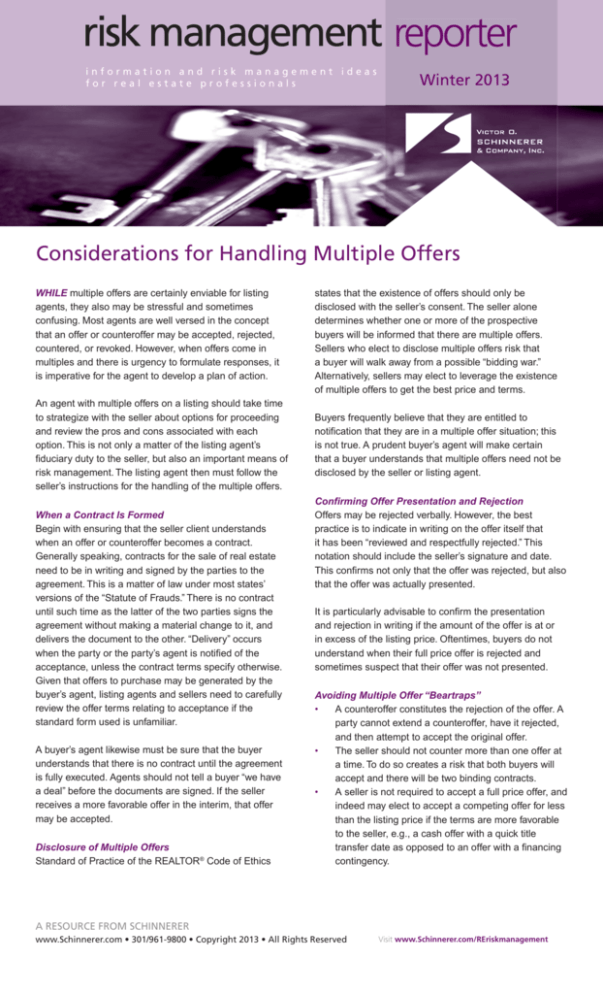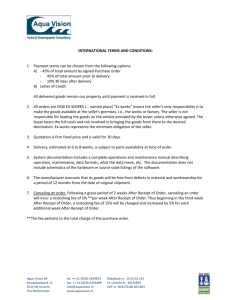
risk management reporter
information and risk management ideas
for real estate professionals
Winter 2013
Considerations for Handling Multiple Offers
WHILE multiple offers are certainly enviable for listing
agents, they also may be stressful and sometimes
confusing. Most agents are well versed in the concept
that an offer or counteroffer may be accepted, rejected,
countered, or revoked. However, when offers come in
multiples and there is urgency to formulate responses, it
is imperative for the agent to develop a plan of action.
An agent with multiple offers on a listing should take time
to strategize with the seller about options for proceeding
and review the pros and cons associated with each
option. This is not only a matter of the listing agent’s
fiduciary duty to the seller, but also an important means of
risk management. The listing agent then must follow the
seller’s instructions for the handling of the multiple offers.
When a Contract Is Formed
Begin with ensuring that the seller client understands
when an offer or counteroffer becomes a contract.
Generally speaking, contracts for the sale of real estate
need to be in writing and signed by the parties to the
agreement. This is a matter of law under most states’
versions of the “Statute of Frauds.” There is no contract
until such time as the latter of the two parties signs the
agreement without making a material change to it, and
delivers the document to the other. “Delivery” occurs
when the party or the party’s agent is notified of the
acceptance, unless the contract terms specify otherwise.
Given that offers to purchase may be generated by the
buyer’s agent, listing agents and sellers need to carefully
review the offer terms relating to acceptance if the
standard form used is unfamiliar.
A buyer’s agent likewise must be sure that the buyer
understands that there is no contract until the agreement
is fully executed. Agents should not tell a buyer “we have
a deal” before the documents are signed. If the seller
receives a more favorable offer in the interim, that offer
may be accepted.
Disclosure of Multiple Offers
Standard of Practice of the REALTOR® Code of Ethics
states that the existence of offers should only be
disclosed with the seller’s consent. The seller alone
determines whether one or more of the prospective
buyers will be informed that there are multiple offers.
Sellers who elect to disclose multiple offers risk that
a buyer will walk away from a possible “bidding war.”
Alternatively, sellers may elect to leverage the existence
of multiple offers to get the best price and terms.
Buyers frequently believe that they are entitled to
notification that they are in a multiple offer situation; this
is not true. A prudent buyer’s agent will make certain
that a buyer understands that multiple offers need not be
disclosed by the seller or listing agent.
Confirming Offer Presentation and Rejection
Offers may be rejected verbally. However, the best
practice is to indicate in writing on the offer itself that
it has been “reviewed and respectfully rejected.” This
notation should include the seller’s signature and date.
This confirms not only that the offer was rejected, but also
that the offer was actually presented.
It is particularly advisable to confirm the presentation
and rejection in writing if the amount of the offer is at or
in excess of the listing price. Oftentimes, buyers do not
understand when their full price offer is rejected and
sometimes suspect that their offer was not presented.
Avoiding Multiple Offer “Beartraps”
•
A counteroffer constitutes the rejection of the offer. A
party cannot extend a counteroffer, have it rejected,
and then attempt to accept the original offer.
•
The seller should not counter more than one offer at
a time. To do so creates a risk that both buyers will
accept and there will be two binding contracts.
•
A seller is not required to accept a full price offer, and
indeed may elect to accept a competing offer for less
than the listing price if the terms are more favorable
to the seller, e.g., a cash offer with a quick title
transfer date as opposed to an offer with a financing
contingency.
A RESOURCE FROM SCHINNERER
www.Schinnerer.com • 301/961-9800 • Copyright 2013 • All Rights Reserved
Visit www.Schinnerer.com/REriskmanagement
•
•
A seller is not obligated to give the first prospective
buyer an opportunity to increase their offer before
accepting a second offer.
Agents should use the words “offer” versus
“contract” with precision so as not to create any
misunderstanding. A buyer writes an offer on a
property, not a “contract.” There is no contract until
acceptance and delivery.
Accepting Offers Via Email
Real estate professionals who indicate a client’s offer or
acceptance via email, or who forward a communication
from their client evidencing terms of an offer or
acceptance, may unwittingly bind their client to a real
estate purchase or lease agreement. While it is still
the conventional practice to have an original document
executed by the parties, courts nationwide are now
considering electronic agreements to have the same legal
effect. In that regard, agents must exercise caution in
conveying information about an acceptance, counteroffer,
or rejection to the other agent or party in the transaction.
For example, if a listing agent sends an email to the
buyer’s agent saying “my seller accepts your offer,” it is
arguable that the listing agent will be deemed to have
acted on behalf of their principal, and that the agent’s
action is binding upon the principal.
Obtaining Advice from Legal Counsel
If at any point in time an agent is uncertain about how to
advise any client in a multiple offer situation, the agent
should promptly seek advice from a management level
licensee or counsel to the brokerage. Sometimes talking
through the situation and getting a second opinion can
help to clarify the next steps to be taken. The client
likewise should be advised in writing to consult with
independent legal counsel if they have questions about
the legal ramifications of how to proceed.
In rare circumstances, a buyer may believe that he is
entitled to purchase a property even though a binding
contract has not been formed. If a buyer threatens to
assert legal action in the event that the seller does
not sell to them, an agent should promptly advise the
client to consult with an attorney. The agent should also
immediately notify their broker or management.
Risk Management Reporter thanks Cynthia A. Lammert,
Esq., of the Reminger Attorneys at Law firm, for writing
this article: 101 West Prospect Avenue, Suite 1400,
Cleveland, Ohio 44115-1093; phone: 216-430-2212;
email: clammert@reminger.com.
Agents similarly should use care in relaying emails from
clients to another party or their agent. For example, if
the seller tells their agent in an email containing their
signature that “the offer is acceptable and I will sign the
paperwork upon my return from vacation” and the agent
forwards the seller’s email to the buyer’s agent or to
the buyer, the seller’s email may be deemed to create
a binding agreement. Given that the email from the
seller conveys their acceptance of the offer terms and
the agreement is signed electronically by the seller, it
is arguably an acceptable contract under the statute of
frauds. The seller may find themselves compelled to sell
if the listing agent forwards the seller’s email to the other
party or their agent. This may become a sticky legal issue
for the listing agent if the seller later claims that the agent
was not authorized to forward the “acceptance” email to
the buyer’s agent.
Courts seem to be increasingly inclined to honor
email communications as binding. In Shattuck v.
Klotzbach (Mass. Super. 2001), 14 Mass.L.Rptr. 360, a
Massachusetts court held that “the typed name at the
end of an e-mail is more indicative of a party’s intent to
authenticate than that of a telegram as the sender of an
e-mail types and sends the message on his own accord
and types his own name as he so chooses.”
Real estate brokers and agents should consider including
a standard disclaimer in all email communications
clearly stating that the content may not be deemed an
offer, counteroffer, or acceptance until paper documents
are mutually executed between the parties. This is
the case for any email communications relaying an
offer, counteroffer, terms of a purchase or lease, or
any other communication where it is arguable that the
communication forms the basis of the terms of an offer,
counteroffer, or acceptance.
The purpose of this article is to provide general information, rather than advice
or opinion. It is accurate to the best of the authors’ knowledge as of the date
of the article. Accordingly, this article should not be viewed as a substitute for
the guidance and recommendations of a retained professional. In addition, CNA
does not endorse any coverages, systems, processes or protocols addressed
herein unless they are produced or created by CNA.
Any examples are for illustrative purposes only and any similarity to actual
individuals, entities, places or situations is unintentional and purely coincidental.
In addition, any examples are not intended to establish any standards of care, to
serve as legal advice appropriate for any particular factual situations, or to provide
an acknowledgement that any given factual situation is covered under any CNA
insurance policy. Please remember that only the relevant insurance policy can
provide the actual terms, coverages, amounts, conditions and exclusions for an
insured. All CNA products and services may not be available in all states and may be
subject to change without notice.
CNA is a service mark registered with the U.S. Patent and Trademark Office.
Copyright © 2013, Continental Casualty Company. All rights reserved.
Risk Management Reporter is published by Victor O. Schinnerer & Co.







